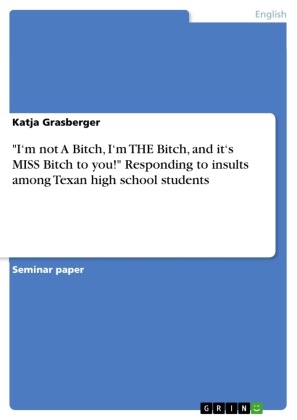Read more
Seminar paper from the year 2014 in the subject American Studies - Linguistics, grade: 2,0, University of Bonn (Anglistik), course: Variational Pragmatics, language: English, abstract: So far little work has been done to investigate impoliteness, but a lot has been done on politeness. Can politeness even work without a complete overview of impoliteness in the same amount? Not only has there been rarely any research on how impoliteness works and when it occurs, but also the research of how people cope with impoliteness has been vastly neglected.
Especially when it comes to insults people tend to pretend that they never insult anybody or even swear. Only would they insult somebody if they were insulted. Too many theories consider (im)politeness a single-turn-thing, but it gets even more interesting when it occurs in interaction. In insult situations there will always be the insulter who realizes the first insult and the insultee who receives the insult. The insultee sometimes will become an insulter as well.
Why do insultees feel the urge to retaliate the insult being paid on them? Gouldner puts forward the idea of a reciprocity social norm, meaning that behavior, prosocial or anitsocial should be equally matched. Does this retaliation differ across gender? Are males or females more likely to counter with aggressive strategies? Who uses which strategy most and especially which taboo words are used in combination with insults?
To investigate this field a discourse completion task has been conducted to elicit counterstrategies to insults. The informants were high school students aged between 15-19, both male and female, from a small town called Rosebud-Lott in the South-East of Texas. To understand responses to insults, the next chapter will introduce the general idea of impoliteness and shows how impoliteness, face and insults belong together. Furthermore previous studies to impoliteness and first attempts to come up with impoliteness-strategies are explained.
The third chapter will give detailed information on the methodology. Why using a DCT was useful, who were the informants, how the data was collected and what the drawback of a DCT is. In the end the coding scheme will be listed and explained to understand the next chapters where the data is being analyzed. In chapter four the most interesting results will be presented and further down the line in chapter five we will discuss contradicting and striking results focusing on female and male differences which will be compared to previous studies. Chapter six will summarize the question posed, the findings, limitations of study and then give an outlook for further research.

